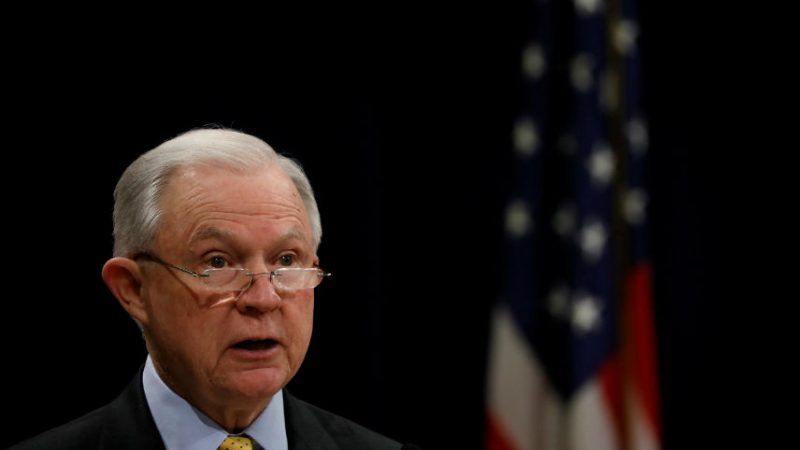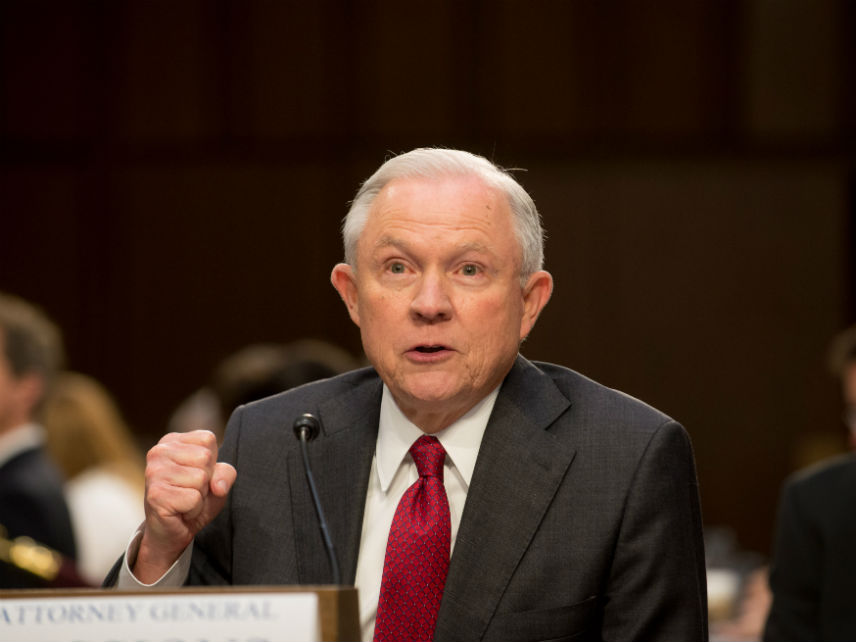Jeff Sessions Says Opioid Addiction Starts With Marijuana. Here Are 6 Studies That Say Otherwise
Sessions: "We think a lot of this is starting with marijuana and other drugs, too."


Attorney General Jeff Sessions thinks marijuana may be a gateway to prescription opioid and heroin addiction. In fact, a number of academic studies show lower rates of opioid abuse and overdoses in states that have legalized medical marijuana.
Speaking at a Heritage Foundation event last night in honor of the late Ronald Reagan's birthday, Sessions lamented the "permissive rhetoric" and media coverage surrounding marijuana and other drugs.
"We don't think illegal drug use is 'recreation.' Lax enforcement, permissive rhetoric and the media have undermined the essential need to say no to drug use. Don't start," Sessions said. "That's what President Trump said to us the other day in a meeting. What did Nancy Reagan say? Just say no. Don't start this stuff."
Sessions was also asked during a Q&A section about the opioid crisis. "My goal for 2018 is to see a further decline," he replied "We had a 7 percent decline last year in actual prescriptions of opioids. We think doctors are just prescribing too many….These pills become so addictive, and the DEA said a huge percentage of the heroin addiction starts with prescriptions. That may be an exaggerated number—they had it as high as 80 percent—but we think a lot of this is starting with marijuana and other drugs, too. We'll see what the facts show, but we need to reduce the prescription abuse and hopefully reduce the addiction that's out there."
WATCH: Attorney General Jeff Sessions says his goal for 2018 is to see a further decline in prescriptions of opioids, and says, "we think a lot of this is starting with marijuana and other drugs." pic.twitter.com/paWSsEuNrl
— NBC News (@NBCNews) February 7, 2018
If marijuana use leads to opioid abuse, you might expect states where pot can be obtained legally to have a bigger opioid problem. Yet numerous studies have found the opposite:
- A 2017 study published in Drug and Alcohol Dependence found that states that legalized medical marijuana reported on average 23 percent fewer hospitalizations for opioid addiction and 13 percent fewer hospitalizations for opioid overdoses.
- A 2017 study found that New Mexico patients with chronic pain who enrolled in the state's medical marijuana program were likely to reduce their opioid dosage or even cease opioid use altogether.
- A 2017 study in Colorado found that marijuana legalization "was associated with short-term reductions in opioid-related deaths."
- A 2016 study published by the American Journal of Public Health reported that fatally injured drivers in car crashes were less likely to test positive for opioids in states with legal medical marijuana.
- A 2016 study looking at prescriptions covered by Medicare found that "the use of prescription drugs for which marijuana could serve as a clinical alternative fell significantly once a medical marijuana law was implemented."
- A 2014 JAMA study found that states with legalized medical marijuana had on average a nearly 25 percent lower mortality rate for opioids.
The Justice Department did not immediately respond to a request for comment or additional information.
